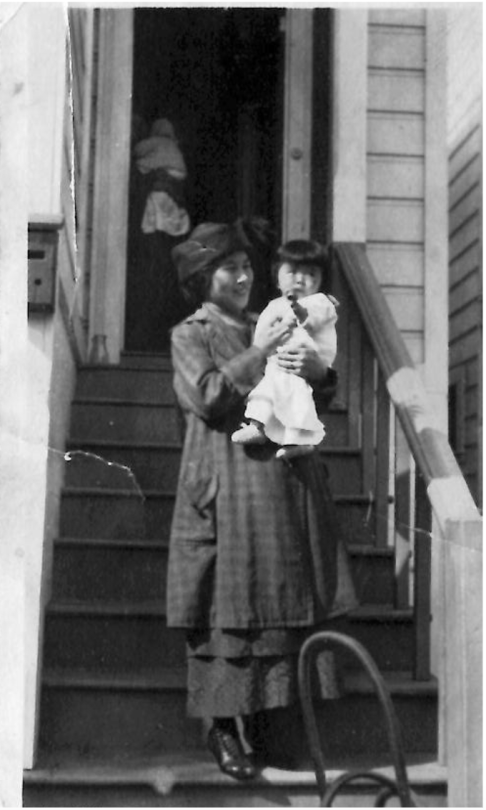By Vivian Fumiko Chin

I don’t think I’ve ever heard my mother laugh out loud, although I could be wrong because a few years ago she must’ve seen a PBS special, and she said she liked watching George Carlin, even though she hates cursing. But I didn’t watch it with her so I didn’t hear anything. I am fairly certain that she’s never told a joke, but I asked her just to make sure. “Oh, I don’t think so,” she said as I stopped myself from saying or asking anything worse.
A few years ago my mother told me that I was obachan’s baby. I’m not sure exactly how that makes sense – was I meant to be a replacement for my grandmother who died before I was born? Was I meant to be her reincarnation, even though my mother is a diehard Christian? How do I belong to my obachan? She told me this as I tried to explain how I had felt responsible for her happiness when I was little, growing up being told that I was an extra child, that she only wanted two children. “Oh, and you were the third,” she said, as my throat tightened.
My mother knit me a pair of socks in grey and bright orange variegated wool. They’re easy to find and they keep my toes warm. Thanks, mom.
When my father was dying he said he dreamed that his mother, my mother, and I became the same person. I smiled. I’m not sure what he said next. His mother was married at 16, had bound feet, and was the second wife to a man who had two wives at the same time. My father’s mother never left China. When I went to visit her and she asked me to hand her the vinegar from the cupboard, she was so pleased that I understood her that she hugged me and told me something simple enough for me to understand. She was so glad that I had come all the way from America and could hear her and understand her. I could understand enough to give her the vinegar but not much else, like understand if her life was better, worse or just different since 1949.
My mother’s grandmother – really her step-grandmother – traveled in a palanquin in the old days. It couldn’t have been comfortable to kneel in a box as it swung back and forth. But my mother recites this as proof of her high social status.
Obachan gave up one of her babies, a daughter, for her stepmother to raise in Japan while she returned to the US. She went back later, but things didn’t work out and they came back to California. As a widow, how was she to raise four children on her own? She worked in people’s kitchens, she taught Japanese. She had to get remarried.
My mother used to say that she married my father because he was assertive. He wouldn’t let anyone push him around.
Lying not laying on a hard twin bed next to my mother who is in another twin bed, sleeping, I listen to her breathing. Later I will think that it reminded me of the calm of my son’s breathing, sleeping deeply when he was a baby. An ignorance-is-bliss peaceful breathing. A body at rest. Like sitting on the beach, seeing dolphins gently gliding through the water. Wanting to bind myself, wrap my limbs, become that strange unknowable animal whose experience I cannot understand. Dolphins sleep with one side of their brain alert, to allow them to surface for air and to be aware of predators. My mother is as unfathomable to me as a dolphin.
Standing on the steps of a neighbor’s house in Alameda, holding one of the babies that died, my grandmother wore a hat and button up shoes. In 1922 she was pregnant with my mother, and beautiful.
My mother is all dressed up with no place to go, wearing a dress she sewed herself. I wish I had it now: it’s a cotton print with flowers, quarter sleeves, a collar, and it gathers at the waist. She is wearing lipstick and she is also beautiful, posing in front of a tarpaper barrack in Heart Mountain, Wyoming in 1944.
The other day I was telling my mother about the crazy stripes on my legs. I used some stick sunscreen and put it on all unevenly and sat on the beach looking for dolphins. First there were red stripes of all widths, running up and down my legs. Then they turned brown. My mother chuckled.
About internment, my mother has said, “I tell people that I’m not bitter – my daughter is the one who is angry.”
About the Author: Vivian Fumiko Chin taught at Mills College for many years and is now teaching at SFSU. Vivian identifies as abc, sansei, and queer in the largest sense of the term.

